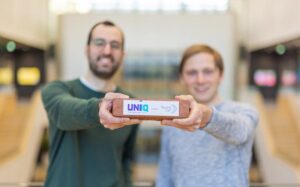Themes
Business
Talent
At the park
Communities
Jobs & internships
Events
News
Contact
Proof-of-concept fund UNIIQ is investing 350,000 euros in Delft startup SoundCell together with DE (Delft Enterprises). The TU Delft spin-off is developing innovative technology that can measure the vibrations made by living bacteria. SoundCell’s technology has major implications for the detection and prevention of antibiotic resistance.

Aleksandre Japaridze and Irek Roslon, SoundCell
SoundCell will use the investment to develop a prototype of its device that can be used and tested in a hospital and to conduct additional clinical research.
Vibration as an indication
To accurately measure the vibrations of a single bacterium, SoundCell uses membranes made of graphene – a material consisting of a single layer of carbon atoms arranged in a pattern that visually resembles a honeycomb. By exploiting the extremely sensitive properties of graphene and the biological processes in bacteria, SoundCell provides insight into whether a bacterium is still alive (vibrating) after administration of an antibiotic. Initial experiments with E. Coli bacteria were clear: if the bacteria were resistant to the antibiotic, the vibrations remained at the same level. If the bacteria were not resistant, the vibrations decreased after administration of the drug.
“To understand how small these vibrations are, you can say that they are at least ten thousand times smaller than the thickness of a hair”
– SoundCell
The full article can be read on the InnovationQuarter website
As of June, the Leiden Bio Science Park team has been joined by Gerwin Zomer, who steps into the role of Account Manager Physical Living Environment. To get to know him a bit...
Researchers at the Leiden University Medical Center (LUMC) have announced promising early results from a clinical trial using lab-grown insulin-producing islet cells derived from...
VarmX has received IND approval for its Phase 3 trial of VMX‑C001, a recombinant factor X variant designed to neutralize FXa‑inhibiting anticoagulants during emergency surgery. Backed by robust Phase 1 data and boosted by a €15 million EIC investment, this step positions VMX‑C001 to meet a gap in urgent haemostasis care.